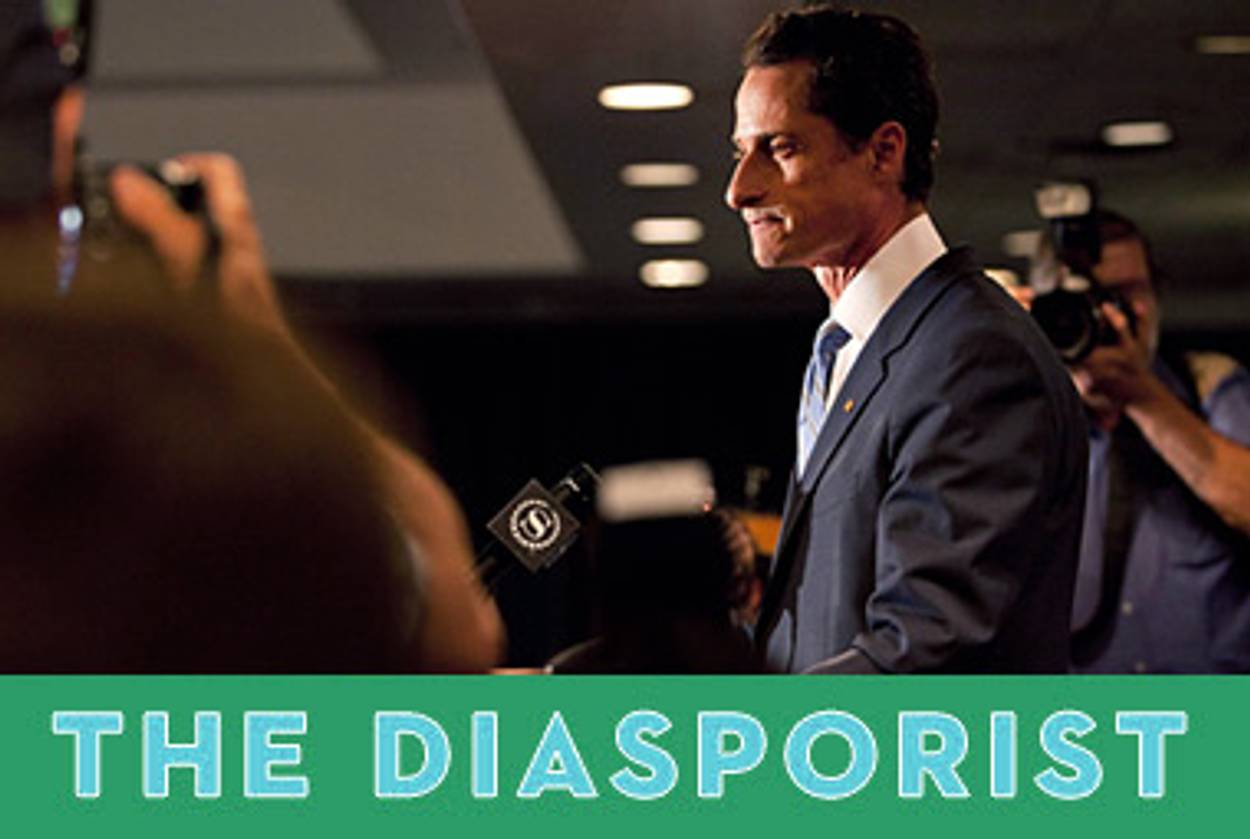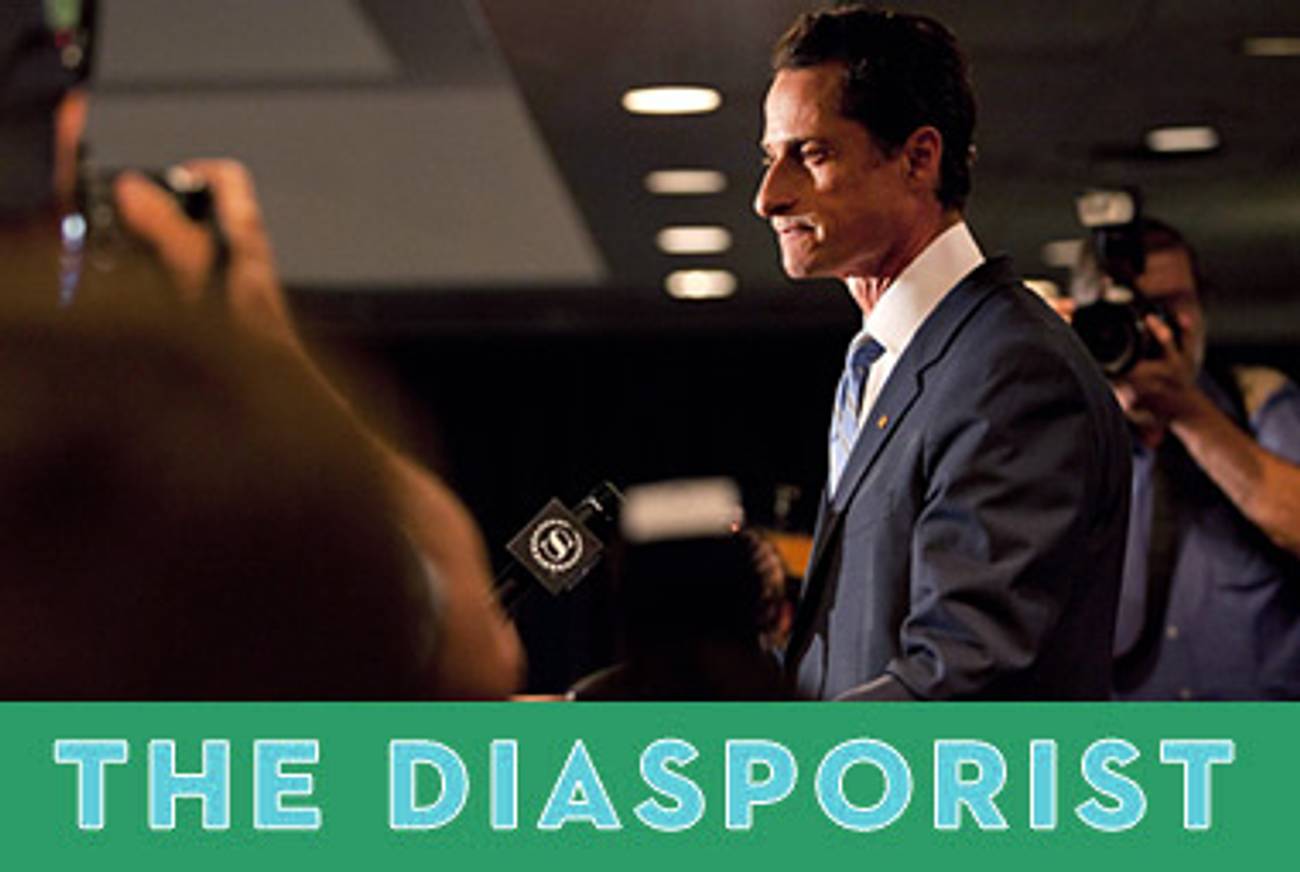Private Parts
The scandal seems to be less about Anthony Weiner’s sexual social networking than the fact that he got caught. As technology thins the line between public and private, do politicians retain a right to be human?




The national humiliation of Rep. Anthony Weiner represents something new in the politics of sex scandals. Ordinarily, these scandals come with a pretext, however thin, of public interest. The issue, we’re usually told, isn’t just sex—it’s a cover-up, or hypocrisy, or harassment, or financial malfeasance. But in Weiner’s case, the excuses for the salacious national pile-on are exceptionally thin. They mostly come down to the fact that, when confronted with an embarrassing secret vice, Weiner panicked and lied. There’s also shock at his extreme recklessness in risking such a scandal, though if that’s what the scandal is about, it’s weirdly recursive. In the end, it’s hard to escape the conclusion that Weiner is being publicly annihilated for private, consensual communications that have hurt no one but himself and presumably his wife.
It’s understandable why his actions leave people disgusted. It would be less skeevy if he met his cybersex partners in cybersex forums, instead of enlisting his political admirers into masturbatory exchanges. The brazenness of his exhibitionism is unsettling; it appears at once narcissistic and, as Laura Kipnis has written, masochistic. He’s embarrassed his pregnant wife and his Democratic colleagues. Worst of all, from a strictly partisan point of view, he’s revived the credibility of the odious Andrew Breitbart.
But the core of his transgression was a small and mundane thing—engaging in sexual fantasies on the Internet. The fact that this has led to a salacious national excoriation has disturbing implications not just for Weiner, but for us all.
I say this with one caveat. It seems likely that Weiner tweeted the photo of his erection to a Seattle college student by accident, intending to send it to the porn star who was alphabetically just beneath her in his contacts queue. (By now, it seems beside the point to express dismay at having to write sentences like the previous one.) If it was something more than that—if he intended to send an unbidden picture of his penis to a young woman whose only interest in him was political—that is an inexcusable act of harassment.
Some feminists have argued that, consensual or not, the content of his exchanges reveals a man with a twisted attitude toward women. On the Daily Beast, Kirsten Powers, an ex-girlfriend and onetime close friend of Weiner’s, described being deeply disturbed by what he wrote to Las Vegas blackjack dealer Lisa Weiss. “Radar Online posted the transcript, and it is rife with misogyny and distorted views about women,” she writes. “In referring to oral sex, Wiener tells her, ‘You will gag on me before you c** with me in you’ and ‘[I’m] thinking about gagging your hot mouth with my c***.’ This is not about sex. It’s about dominating and inflicting physical pain on a woman, a fantasy the hardcore porn industry makes billions of dollars on selling to men.” These comments helped convince Powers, once a Weiner supporter, that he should resign.
Here’s my problem with this. It’s one thing to argue that Weiner should step down for being stupid enough to bring this kind of attention on himself, his family, and his party. It’s another thing to subject someone’s sexual fantasies to a political litmus test. Weiner is hardly outré in the way he eroticizes power. There’s no evidence, in the Powers piece, that Weiner actually treats women badly—indeed, she describes him as a loyal and thoughtful friend. There is something totalitarian about examining people’s erotic lives for ideological deviance.
That’s why human beings—even exhibitionists—need privacy. Until very recently, there was a tacit understanding that politicians, like the rest of us, had secret sides that needed to be accommodated. Few people think that FDR or JFK’s dishonesty about their sex lives somehow poisoned their ability to conduct the nation’s business. In recent years, though, two great forces conspired to do away with the ability of public figures to keep sexual impropriety discreet—feminism and technology.
It is a good thing, of course, that feminism banished the clubby understandings that enabled not just philandering but widespread sexual harassment and even rape. The drama around Dominique Strauss-Kahn is a stark reminder of the dark side of a radically laissez-faire attitude toward powerful people’s sexual appetites. During the impeachment of President Bill Clinton, liberals like myself looked longingly at France’s seemingly blasé sophistication, its urbane disinterest in its leaders’ sexual peccadilloes. Now we’ve learned that that disinterest extended to cases of coercion and assault.
It turns out that Strauss-Kahn’s penchant for pressuring women into sex was a sort of open secret, but few reported on it for fear of transgressing French norms of privacy. In the wake of his arrest in New York for allegedly trying to rape an immigrant maid, many French politicians and intellectuals have offered a dispiriting refresher course on the misogyny underlying the country’s culture of sexual entitlement. Journalist Jean-François Kahn dismissed the whole affair as a “troussage de domestique”—sometimes translated as lifting the skirt of a servant—as if Strauss-Kahn was simply a high-spirited aristocratic scamp. (Kahn later issued regrets for having made the statement.)
The television series Mad Men, set in the early 1960s, captures the American version of this mentality, which prevailed until feminism challenged it. That’s why the Clarence Thomas hearings were such a watershed—women are, thankfully, no longer expected to endure overtures and sexual taunts from our superiors. This is a prerequisite for equality.
Technology has further eroded people’s ability to have one self in public and another in private. Think of Jon Favreau, the Obama speechwriter forced to apologize for groping a cardboard cutout of Hillary Clinton at a drunken party. Given this, it was madness for Weiner to think his online life could remain secret. But this requirement that even moderately public people behave in publicly acceptable ways all the time? That’s madness, too.
Lately, we’ve seen a number of people undone for slips in the half-public world of social media. Last year, the conservative Daily Caller obtained the archives of a private listserv for left-of-center reporters and writers called JournoList, gleefully combing them for damaging tidbits. The Washington Post’s David Weigel lost his job for some of his comments, including one that suggested that Matt Drudge should set himself on fire—a bit of obviously jokey hyperbole that no one would have noticed had Weigel said it at a bar. In February, the ultra-intrepid war reporter Nir Rosen had to resign from his position at NYU’s Center for Law and Security because of an offensive and quickly regretted Twitter crack about journalist Lara Logan’s sexual assault in Egypt.
Now, people say offensive things about their colleagues and competitors all the time in ordinary life, and no one blinks. For both Weigel and Rosen, the sin wasn’t the words themselves, but the carelessness of letting them leak into the public sphere. The same is true of Weiner, even if his misdeeds are more serious. Very few of us could survive having our offhand comments or secret thoughts subjected to the public scrutiny of political enemies.
It could be that the ability to guard one’s public image, despite the Internet’s intrusions and temptations, is a requisite of modern political life. In that case, Weiner will have to go. But his crime wasn’t engaging in legal and not even particularly kinky cybersex. It was getting caught.
Given the virtual panopticon we now live in, Weiner won’t be the last person to be subjected to this kind of merciless exposure and ridicule. That’s why at some point, unless we want to endure a constant cycle of scandal and personal destruction, we should really figure out some way of forgiving people for being grossly human in public.
Michelle Goldberg is a senior contributing writer at The Nation. She is the author, most recently, of The Goddess Pose: The Audacious Life of Indra Devi, the Woman Who Helped Bring Yoga to the West. Her Twitter feed is @michelleinbklyn.
Michelle Goldberg is a senior contributing writer at The Nation. She is the author, most recently, of The Goddess Pose: The Audacious Life of Indra Devi, the Woman Who Helped Bring Yoga to the West. Her Twitter feed is @michelleinbklyn.